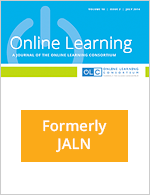Network Analysis of Knowledge Construction in Asynchronous Learning Networks
Asynchronous Learning Networks (ALNs) make the process of collaboration more transparent, because a transcript of conference messages can be used to assess individual roles and contributions and the collaborative process itself. This study considers three aspects of ALNs: the design, the quality of the resulting knowledge construction process; and cohesion,...

